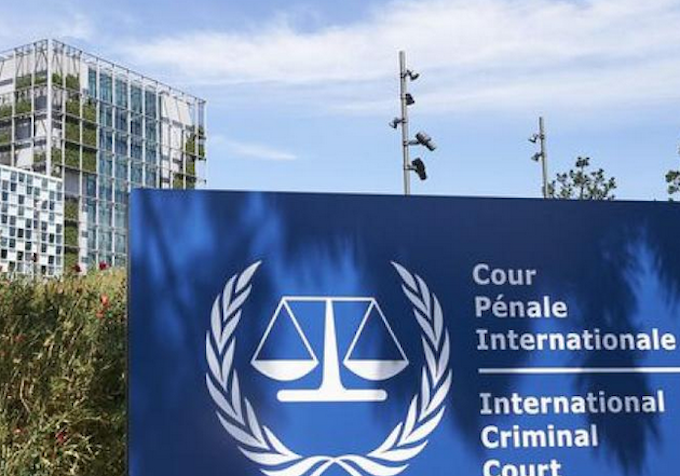
Pacific Media Watch newsdesk
Reporters Without Borders (RSF) has filed a complaint with the International Criminal Court’s chief prosecutor about Russian strikes on four radio and TV towers in Ukraine since March 1 that constitute a war crime.
The strikes have prevented Ukrainian media from broadcasting. At least 32 TV channels and several dozen radio stations have been affected, reports the Paris-based global media freedom watchdog.
Since Russia launched its invasion of Ukraine on February 24, it has deliberately targeted TV antennae throughout the country.
Under international law, antennae used for broadcasting radio and TV signals cannot be regarded as legitimate military targets unless they are used by the armed forces, or are temporarily assigned to military use, or are used for both civilian and military purposes at the same time.
RSF’s complaint demonstrates that the TV towers were civilian in nature, and that Russia deliberately targeted Ukrainian media installations because, Russia said, these installations were participating in “information attacks”.
The complaint filed by RSF emphasises the intentional nature of these attacks, and the fact that they are being carried out on a large scale, which shows that they are part of a deliberate plan.
“Deliberately bombarding many media installations such as television antennae constitutes a war crime and demonstrates the scale of the offensive launched by Putin against the right to news and information,” RSF secretary-general Christophe Deloire said.
Plea on crimes against media
“These crimes are all the more serious for clearly being part of a plan, part of a policy, and for being carried out on a large scale. We call on the International Criminal Court’s prosecutor to put crimes against media and journalists at the heart of the investigation he opened on February 28.”
The ICC’s chief prosecutor announced on February 28 that he was opening an investigation into the situation in Ukraine.
On March 2, 39 countries that are parties to the Rome Statute (the treaty establishing the ICC) formally referred the situation in Ukraine to the prosecutor.
These referrals allow him to begin his investigations at once, without having to seek authorisation from the court’s judges first.
After Kyiv being fired on by the Russian armed forces for the previous week, the city’s TV tower was hit by a precision strike on March 1 that abruptly terminated broadcasting by 32 TV channels and several dozen national radio stations.
This deliberate strike had been announced in advance by the Russian Defence Ministry. Under the guise of protecting civilians, the Defence Ministry issued a signed confession to its crimes.
The Kyiv TV tower — which had an adjoining technical building that was destroyed by the bombardment — had no military use and was used only by civilian TV and radio stations, such as the public TV channel UA Pershiy, the privately-owned TV channel 1+1 and the TV news channel Ukraine 24.
Broadcasts were cut short
The viewers and listeners of these media outlets, whose broadcasts were cut short by the Russian strike, had to switch to satellite operators or go online to access their programming until broadcasting was reinstated later in the day.
The Russian strike killed Evgeny Sakun, a cameraman working for the Kyiv Live local TV channel who was at the TV tower, and four other people.
Since that first major attack on an essential installation for accessing news and information, Russia has attacked other TV towers.
According to the information obtained by RSF and its local partner IMI, at least three other radio and TV towers, in Korosten, Lysychansk and Kharkiv, have been the targets of Russian strikes, and two radio antennae, in Melitopol and Kherson, stopped broadcasting after Russian soldiers took control of those cities.
Strikes targeted the TV tower in the city of Lysychansk (in the Luhansk region, whose independence Russia has recognised) late in the morning of March 2. The radio and TV tower in the northeastern city Kharkiv was targeted by two Russian missiles shortly before 1 pm, causing its broadcast to be suspended.
Later the same day, another strike destroyed the TV tower in the norther city of Korosten.
These strikes against telecommunications antennae show a clear intention by the Russian armed forces to prevent the dissemination of news and information. The warning issued shortly before the attacks makes it clear that Russian military want to end what they call “information attacks”.
This desire is confirmed by the fact that the Russian army has cut Ukrainian TV and radio signals in several cities after taking control of them. In the southern region that Russia has invaded from Crimea, the occupation forces have blocked Ukrainian TV and radio broadcasts from the telecommunication towers in the cities of Melitopol and Kherson.
Russian ‘fake news’ law cripples media
The equipment on these towers has been changed and they are now broadcasting the pro-Kremlin propaganda channel Russia 24.
The satellite signal of UA Pershiy, a TV channel owned by the Ukrainian public broadcasting corporation Suspline, is meanwhile being subjected to jamming attempts by Russia, and its website was hacked on March 1.
Meanwhile, RSF has called on the Russian authorities to immediately repeal a draconian law adopted on March 4 that makes the publication of “false” or “mendacious” information about the Russian armed forces punishable by up to 15 years in prison.
It leaves little hope for the future of the country’s few remaining independent media outlets.
Many leading foreign media — including the BBC, CNN, Bloomberg News, ABC, CBS News and Canada’s CBC/Radio-Canada — have decided to temporarily suspend broadcasting or news gathering in Russia since the amendment, which applies to foreign as well as Russian citizens, was signed into law by President Vladimir Putin.
Ukraine is ranked 97th out of 180 countries in RSF’s 2021 World Press Freedom Index, while Russia is ranked 150th.
Pacific Media Watch collaborates with Reporters Without Borders.













































